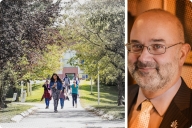You have /5 articles left.
Sign up for a free account or log in.
One of the main thrusts of what has come to be called "the undergraduate student success movement" is misguided. Yes, we did mean to use the term "misguided." A strong word and a strong assertion, but we have equally strong evidence. Simply stated, higher education institutions in the United States focus heavily on student success programs, but rarely do they have a comprehensive plan to guide those programs. In the absence of a plan, redundancies and gaps occur, and retention stagnates. In short, a program or programs do not a successful plan make.
Of course, making this assertion means that John Gardner, one of this essay’s authors and a key architect in the national student success movement, has to admit that over the years he may not have given the best advice to all people at all times. For about three decades, Gardner has gone around the country telling college educators that their institutions need to adopt or adapt one form of student success program or another. Drawing from his experiences, the recommended program was often a first-year seminar -- a contemporary staple in the American college curriculum that dates back to the 1880s. And, in fact, research does correlate participation in first-year seminars with positive differences in student retention and graduation rates.
At the same time that Gardner was advocating for first-year seminars in particular, he was also advocating for a broader philosophical approach to the first year. He coined the term, “the first-year experience,” and meant it to encompass a total campus approach to the first year, not a single program. Upon reflection, it seems that speaking about one program extensively while at the same time advocating for a collective approach may have fostered a bit of confusion. And today the “first-year experience” can mean anything from a single course to a full-fledged coordinated effort to improve the first year. But it was the single course that gained the most national and international interest.
Gardner himself ran University 101, a first-year seminar at the University of South Carolina, for 25 years, and then helped replicate this course type at many other institutions. Colleges and universities often adopted first-year seminars because they increased retention rates, and thus increased tuition revenue. Educators were hunting for the silver bullet -- the “program” that would bring about miraculous student-saving and money-making results. This search for the ideal program also became subsumed under the language of “best practices.” The idea was very simple: there are best practices out there, they can be identified and replicated with minimal thought given to context, and these best practices should yield the same results everywhere. But retention improvements that resulted from one-shot programs have generally been short-lived and, taken together, have failed to move the national retention statistics in a positive direction.
Fast-forward several decades, and this search has been intensified. A plethora of organizations and consultants now exist to feed the hunger for specific programmatic solutions to the retention problem. Clearly it is time for a change.
Beginning in 2003, with support from several foundations, the Gardner Institute for Excellence in Undergraduate Education launched a process, called Foundations of Excellence in the First College Year -- a self-study and planning process designed to help campuses move beyond “programs” and “best practices” to the development of a comprehensive intentional plan for the first year. Participants in the Foundations of Excellence process are encouraged to answer a fundamental educational question: What does our college or university need to do to provide an excellent beginning experience for all students relative to our unique mission, location, and student characteristics? To answer that question an institution first needs to assess how it is currently performing vis a vis standards of excellence for the first college year. The process provides nine such standards. Finally, once the plan has been created, institutions must implement it.
But implementing a plan is more easily said than done. Our own research on the effectiveness of the institute’s work with 197 institutional participants has found that the two most significant variables that interfere with executing a plan are a change of senior leadership with its resulting destabilizing effects, and the impact of unforeseen budget cuts.
We have also learned from successes. Over 95 percent of the campuses with which we have worked report implementing action plans. An independent analysis of Foundations of Excellence found that campuses that implemented the plans to a self-reported “high degree” recorded significant first-to-second year retention rate increases -- an aggregate 5.62 percentage points or 8.2 percent higher over four years as reported by IPEDS. Institutions that did not implement their FoE action plans experienced a 1.4 percentage point decrease in retention -- in other words, if you don’t implement the plan you have, you seem to get attrition. To plan is not enough. The executed plans included a combination of changes in institutional policies, a renewed focus on pedagogy in first-year courses, and particular programs -- yes, programs -- that were intentionally selected to address the unique needs of the institution and its students. For example, institutions connected their learning community offerings with their evolving core curriculums to maximize the success of both efforts; orientation programs were expanded to include and serve previously underserved and/or completely unserved populations such as low-income and transfer students; and oversight offices and/or committees were created to intentionally connect previously disparate pieces so that learning opportunities were not left to chance.
In conclusion, our experience leads us to convey that while programs are necessary, unless they are conceived and carried out as parts of a whole, they are not sufficient. What we believe is that institutions need to undertake a thorough planning process focused on excellence in the first year. Appropriate programs and best practices can then organically emerge and/or be modified, executed, assessed, and refined in context.
Institutions cannot fulfill their potential for improving student success without a comprehensive vision for excellence in the first year. Thus, we encourage you to recognize that the future of our students is too important to leave to chance. Instead, we hope you and your institution will become more intentional and deliberate in the way you commit to first-year excellence. In the process, you will be contributing nationally as you act locally to create the change and foster growth that our students and country require.








